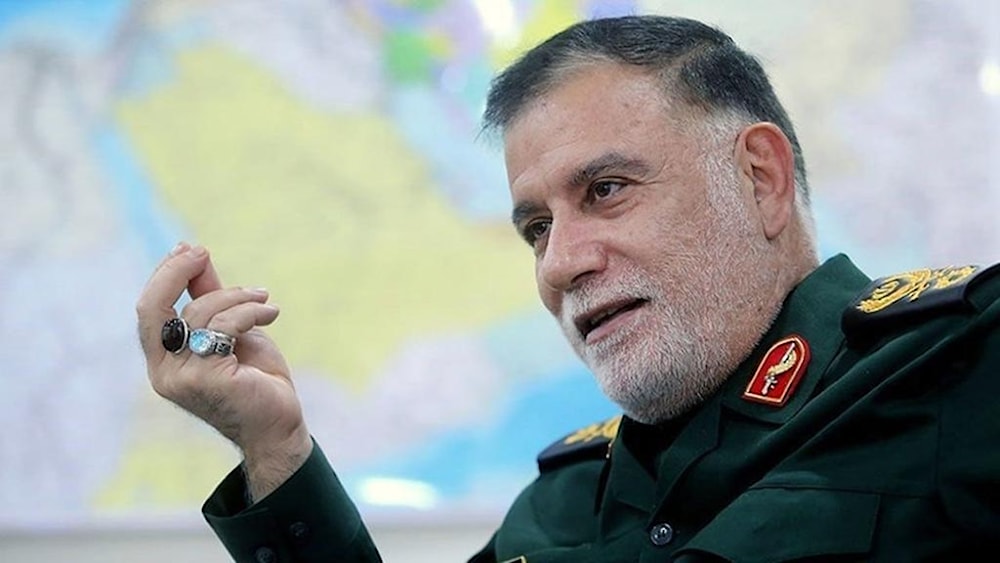Who was the senior IRGC commander martyred alongside Sayyed Nasrallah?
Iranian General Abbas Nilforooshan was martyred alongside Sayyed Hassan Nasrallah on Friday in the Lebanese capital.
-

Deputy Commander for Operations of the Islamic Revolution Guard Corps General Abbas Nilforooshan in an undated photograph. (IRNA)
An Israeli airstrike in Beirut resulted in the martyrdom of General Abbas Nilforooshan, the Deputy Commander for Operations of Iran's Islamic Revolution Guard Corps (IRGC), alongside Hezbollah Secretary-General Sayyed Hassan Nasrallah.
The airstrike, which hit the densely populated Haret Hreik neighborhood in the Southern Suburb of Beirut, involved the use of bunker-buster munitions. The Israeli occupation forces targeted several residential buildings, with four collapsing in total, reducing them to rubble.
The devastating airstrike that used dozens of tons of explosives killed not only the top Hezbollah and IRGC commanders but also impacted scores of civilians, six of whom were killed and 91 were wounded, with many still missing.
The IRGC issued a statement on Sunday confirming the martyrdom of General Abbas Nilforooshan. The statement condemned the actions of the Zionist regime, describing the airstrike as a crime against Lebanon.
It also expressed condolences, while congratulating Nilforooshan on his martyrdom in a statement addressed to Iranian Leader Ayatollah Sayyed Ali Khamenei, the Commander-in-Chief of the Iranian Armed Forces.
Who was the martyred commander?
Born in 1966 in Isfahan, Iran, General Nilforooshan was a distinguished military leader within the IRGC, serving as the Deputy Commander for Operations. His military career began in 1980 when he joined the Basij Organization, a volunteer paramilitary group that serves conjointly with the IRGC, before formally entering the ranks of the IRGC.
His involvement in the Iran-Iraq War (1980-1988), known as the Sacred Defense in Iran, shaped much of his military philosophy and career.
During the Iran-Iraq War, Nilforooshan, despite being only 14 years old, served on both the western and southern fronts, leading several critical military operations. His courage and effectiveness during the war saw him garnering rapid promotions within the IRGC, and he became one of Iran's most respected military strategists.
Following the war, Nilforooshan pursued academic studies in strategic management, earning a Ph.D. from Iran's Imam Hussein University. From 2005 to 2007, he held the position of Deputy Commander for Operations within the IRGC Ground Force.
He later commanded the IRGC Command and Staff College from 2010-2014, where he played a crucial role in training future Iranian military leaders.
In June 2019, he was appointed to the position he would later be martyred under, Deputy Commander for Operations at the order of IRGC Commander-in-Chief Major General Hossein Salami, further solidifying his role as a key figure in the military leadership of Iran.
General Nilforooshan's legacy extends far beyond his military role within Iran. He was a vital figure in coordinating efforts across the Axis of Resistance, which includes Hezbollah in Lebanon and various Palestinian Resistance factions. Through his efforts, the groups expanded their influence and military capabilities, even in the face of sustained threats from the Israeli occupation and its allies.
Known for his commitment to the Islamic Revolution's ideals, Nilforooshan championed the rights of the oppressed in the region, particularly focusing on supporting the Palestinian and Lebanese causes. His strategic vision helped unite resistance groups across different territories, enhancing their ability to combat the occupation and global oppression.
His role in planning and supporting operations across the region made him a central figure in the anti-Zionist, anti-Western Resistance network. As a military commander and a strategic thinker, he was instrumental in forging stronger ties between Iran, Hezbollah, and Palestinian factions, creating a unified front in the face of the Israeli occupation.
Assassination will lead to 'Israel's' destruction: Iran
Iranian officials issued strong statements vowing continued support for Hezbollah and condemning "Israel's" actions.
The leader of the Islamic Revolution in Iran Sayyed Ali Khamenei condemned the Israeli attack and criticized Israeli policies as shortsighted, offering his insights in a short letter.
Iranian President Masoud Pezeshkian said the international community will not forget that the order for "Israel’s" terrorist act to assassinate Sayyed Nasrallah was issued from New York.
In a message of condolences on Saturday, Pezeshkian said the United States cannot absolve itself of complicity with the Zionists in the terror attack against the Hezbollah chief.
He added that "Israel’s" Friday terrorist attack on the Southern Suburb of Beirut and the martyrdom of prominent figures of the Resistance movement, particularly Sayyed Nasrallah, will further strengthen the “tree of resistance."
The Iranian President noted that the Hezbollah leader was the pride of Muslims and the symbol of resistance and finally achieved his long-standing dream – martyrdom.
Iran's First Vice President, Mohammad Reza Aref, warned that martyr Sayyed Nasrallah's assassination will lead to "Israel's" "destruction", stating, "The unjust bloodshed... of Hezbollah's Secretary-General will bring about their destruction."
Nasser Kanani, Iran’s Foreign Ministry spokesperson, declared that martyr Sayyed Nasrallah’s path will continue, asserting, "His sacred goal will be realized in the liberation of al-Quds."
Iranian Parliament Speaker Mohammad Bagher Ghalibaf expressed condolences, emphasizing that Iran will support the Lebanese nation and continue the path martyr Sayyed Nasrallah forged in resisting Israeli aggression.

 5 Min Read
5 Min Read








